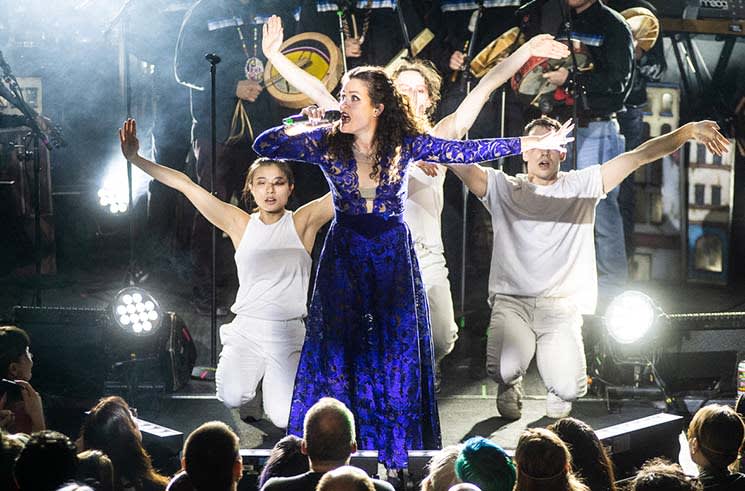I've said before that iskwē's voice is a gift. Watching iskwē live is a gift, one that jolts you to your core, leaving you disoriented, but certain that you'll be okay.
On Friday night, iskwē performed her latest album, acākosīk, at the Mod Club theatre to an audience anonymized by white masks that, according to MC Cherish Violet Blood, put everyone on equal ground. Alex Mak was on guitar, Mary Ancheta on synths and bass, Bradley Connor on drums — which you could feel lifting you up off your feet — and Laura Bates on violin.
iskwē came out with shoulders flanked by broad black-blue feathers, like an earthly angel, not immaculate but also perfect. She spoke to the audience as though they were her beloved friends. Her voice was understanding, not infallible, but comforting, like your conscience reflected back to you.
The songs she performed — about breakups, lust, and also the racism inherent in the way media talked about the murders of Tina Fontaine in 2014 and Colten Boushie in 2016 (her track "Little Star") — didn't leave a person in the room unaffected. There was no way to not be touched by her sound, to not feel her music, her message of remembrance, course through your veins.
iskwē is Cree, from Treaty 1 territory outside of Winnipeg, MB. Halfway through the show, powwow singers arrived: Matthew Stevens, Miigwans Snake, Nimkii Ozaawamik, Josh Musgrave, Clifford Woodcock, Craig Brochman, Josh Janiga and Lucas Isaacs. Their performance was something that spread weightily throughout the room, like a wave that hushed any conversation taking place, that commanded attention.
Something you need to know about iskwē is that she is constantly educating herself about where she is from, because as Cherish Violet Blood noted in introduction to the show, if you don't know where you're from, you won't be able to know where you're going. iskwē took the time during her performance to teach us some words in Cree, and to teach those in the audience who didn't know her words, her lyrics.
She made the room feel so safe, so full of life, and acceptance. All while keeping us aware of Canada's history of abuse towards Indigenous peoples, and feeling her own music in a raw way alongside you.
iskwē is a one-of-a-kind musician, and her album acākosīk, performed live and otherwise, is important in terms of cultural commentary, but also, it's a damn good record.
On Friday night, iskwē performed her latest album, acākosīk, at the Mod Club theatre to an audience anonymized by white masks that, according to MC Cherish Violet Blood, put everyone on equal ground. Alex Mak was on guitar, Mary Ancheta on synths and bass, Bradley Connor on drums — which you could feel lifting you up off your feet — and Laura Bates on violin.
iskwē came out with shoulders flanked by broad black-blue feathers, like an earthly angel, not immaculate but also perfect. She spoke to the audience as though they were her beloved friends. Her voice was understanding, not infallible, but comforting, like your conscience reflected back to you.
The songs she performed — about breakups, lust, and also the racism inherent in the way media talked about the murders of Tina Fontaine in 2014 and Colten Boushie in 2016 (her track "Little Star") — didn't leave a person in the room unaffected. There was no way to not be touched by her sound, to not feel her music, her message of remembrance, course through your veins.
iskwē is Cree, from Treaty 1 territory outside of Winnipeg, MB. Halfway through the show, powwow singers arrived: Matthew Stevens, Miigwans Snake, Nimkii Ozaawamik, Josh Musgrave, Clifford Woodcock, Craig Brochman, Josh Janiga and Lucas Isaacs. Their performance was something that spread weightily throughout the room, like a wave that hushed any conversation taking place, that commanded attention.
Something you need to know about iskwē is that she is constantly educating herself about where she is from, because as Cherish Violet Blood noted in introduction to the show, if you don't know where you're from, you won't be able to know where you're going. iskwē took the time during her performance to teach us some words in Cree, and to teach those in the audience who didn't know her words, her lyrics.
She made the room feel so safe, so full of life, and acceptance. All while keeping us aware of Canada's history of abuse towards Indigenous peoples, and feeling her own music in a raw way alongside you.
iskwē is a one-of-a-kind musician, and her album acākosīk, performed live and otherwise, is important in terms of cultural commentary, but also, it's a damn good record.
